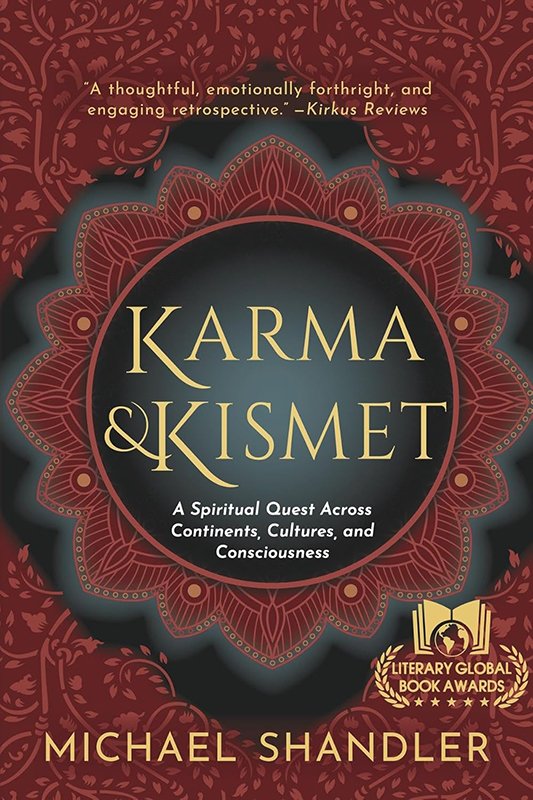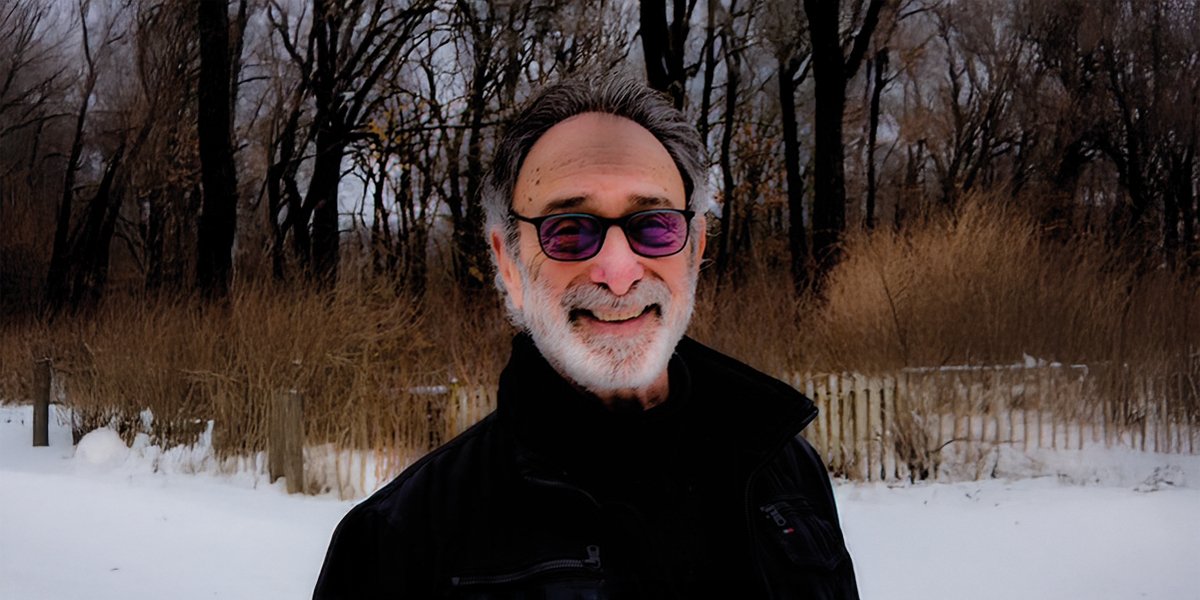Navigating Cultures, Identity, and Personal Growth
Michael Shandler discusses his memoir, Karma & Kismet, reflecting on fate, transformation, and leadership. He shares insights on cultural identity, spiritual awakening, and the power of collaboration in personal and professional growth.
Michael Shandler is a storyteller of rare depth, a seeker of wisdom whose journey through continents, cultures, and consciousness has been nothing short of extraordinary. His award-winning memoir, Karma & Kismet — A Spiritual Quest Across Continents, Cultures, and Consciousness, is a masterful reflection on fate, transformation, and self-discovery, shaped by his experiences growing up in apartheid-era South Africa and his lifelong pursuit of spiritual and psychological insight. Kirkus Reviews aptly describes it as “A thoughtful, emotionally forthright, and engaging retrospective.”
Beyond his memoir, Shandler’s literary contributions span multiple genres, from personal development to leadership and family dynamics. His collaborative works, including The Marriage and Family Book – A Spiritual Guide and The Complete Guide and Cookbook for Raising a Vegetarian Child, showcase his ability to blend practical wisdom with profound human understanding. His writing is not just about sharing knowledge; it is about illuminating pathways for others to navigate the complexities of relationships, identity, and purpose.
In this exclusive interview for Reader’s House, Michael Shandler reflects on the forces of karma and kismet that have shaped his life, the lessons he has drawn from navigating diverse cultural landscapes, and his deep commitment to fostering personal and professional growth. His insights are both timeless and timely, offering readers a powerful lens through which to view their own transformative journeys.
A wise and compassionate storyteller, Michael Shandler inspires with profound reflections on identity, spiritual purpose, and conscious, collaborative living.
What inspired you to write Karma & Kismet, and how did your personal experiences shape the narrative?
I am now an elder pushing eighty. At this stage of life, I’ve had the good fortune and opportunity as a writer to inventory the key events that shaped my life – from dysfunctional familial relationships that ultimately became transformative, to navigating challenging circumstances, to historical lucky breaks – including war, social and psycho-spiritual-cultural rebellion, to awe-inspiring life and death events, all of which presented unimagined opportunities for change. My story is not that of an important personage, but is perhaps remarkable because these seemingly unrelated events and passages form a whole cloth of karma and kismet – action and destiny – that may hold lessons for others who seek to understand the opportunities for change and soul evolution.
“These seemingly unrelated events and passages form a whole cloth of karma and kismet… that may hold lessons for others.” – Michael Shandler
How do you believe the concepts of karma and kismet influence the lives of individuals in the modern world?
Karma and kismet are ancient Eastern and Middle Eastern concepts that speak to the human condition. In that sense, they are timeless principles and have direct application to modern times. Karma can be understood as the actions we take or the circumstances in which we find ourselves, i.e. “Good” karma or “bad” karma. Kismet is fate or destiny, or the unseen hand of a mysterious power that’s guides our lives in powerful ways, despite our thoughts and aspirations. We all can point to examples of both of these constructions.
Could you share some of the most transformative moments in your life that helped shape your path to psycho-spiritual wellbeing?
The beginnings of a transformative process occurred when I was dispatched – against my will at age thirteen – to a boarding school where I couldn’t speak the language. Later, as a young adult, I lived on a kibbutz in Israel where many of my assumptions about nuclear families were challenged, and where I saw first-hand how collaboration toward desired goals is possible and healthy. My attitude toward war was irrevocably challenged on the battle field of the Golan Heights in Syria in the aftermath of the Six -Day War in 1967. Then when I arrived in North America in 1968, I was introduced to psychedelic drugs and began an introspective journey of awakening that ultimately led me to a spiritual path.
How has your background in leadership and organizational development shaped your approach to life coaching and personal growth?
Over the years, I’ve worked with hundreds of individuals and teams in large and small organizations and businesses in numerous countries. Leaders create the systems in which individuals and teams operate, and these systems are often based on unexamined values and unquestioned assumptions. Sometimes those systems foster collaboration toward a desired goal, and sometimes those systems (unconsciously) thwart desired outcomes. In the end, it’s the people factor that matters. Human beings are capable of examining their value systems, changing their own behavior, and creating conscious systems that harness creativity, collaboration, synergy and foster desired results. All these “working” premises apply to the successful navigation in the journey of life.
In your memoir, you discuss the challenges of navigating multiple cultures. How did those experiences affect your understanding of identity and belonging?
When I was thirteen my world was shaken up and turned inside out by my sudden and unwanted immersion in a culture of tough boys who spoke a language I didn’t understand. This immersion lasted for three formative years. These were difficult years, but heralded a journey of discovery about my own cultural and identity assumptions and those of the other boys. We shared some things in common, and sometimes our beliefs were quite different, e.g. our approaches to God, religion and prayer. I began a process of inner seeking – searching for my own core identity – “Who am I?” “What’s important to me?” “Where, and with whom do I belong?” This initial awakening from a kind of identity-slumber was pivotal in the long search for belonging that would form the hallmark of my youth and early manhood, and that would ultimately take me into many different cultures on different continents. Later, this search took the form of conscious searching through such disciplines as meditation and self-enquiry, and I learned that many earnest seekers over the generations and centuries had asked similar questions, and that I could benefit from their discoveries.
How do you combine psychological insights with collaborative techniques in your work to foster personal and professional growth?
Psychological insight means something occurred in your experience that you were able to “mine” that ultimately helped you learn, grow, and change. Sometimes this insight comes from listening to the points of view of others who can see aspects or effects of our behavior we may be blind to. This experiential feedback is a fountain of potential wisdom – if we learn to utilize it. In collaborative situations, asking oneself, “How do my assumptions and behavior impact upon those with whom I share a common goal?” “What am I doing that helps cooperation and collaboration, and what gets in the way?” Acting as though I am “response-able” in every situation, I.e. not responsible as in blaming or justifying my actions, but committing to behaviors that are more likely to foster collaboration rather than competition or defensiveness.
What advice would you give to aspiring authors who want to write about their own transformative journeys?
What is the truth of your experience? Why is it worth including? Are there insights that can help others dealing with similar life issues? Do the work until you come to non-blame of others or circumstances, and root out justifications. What lessons did you get? Forget about other peoples’ opinions or judgements about what you might say. Accept that some will approve and some likely will not. Is there something universal about your experience from which others might benefit? Find your writing purpose, and let that purpose guide what you focus on and what you leave out. A memoir is not an auto-biography, it’s a slice of your life that might have helpful implications for others. If you are not an important person, why would others want to read your book?
EDITOR’S CHOICE
A beautifully written, thought-provoking memoir that inspires self-discovery, celebrates cultural richness, and explores the profound interplay between destiny and choice.



